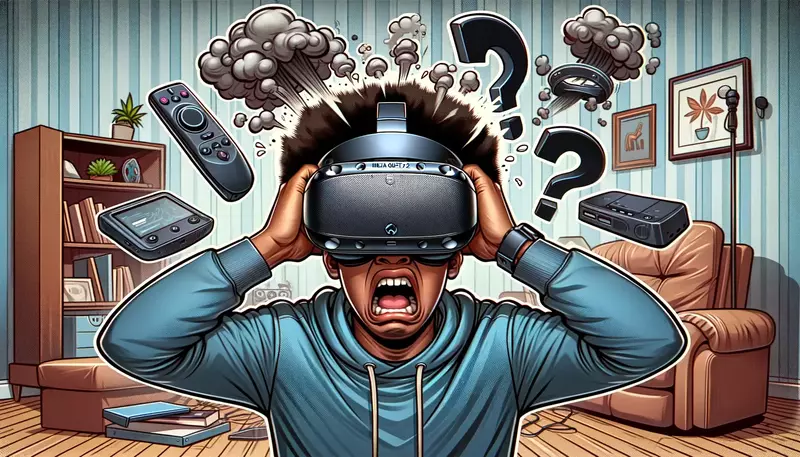This site contains affiliate links to products, and we may receive a commission for purchases made through these links.
Can virtual reality cause tinnitus? Many gamers and VR enthusiasts are keen to understand if their immersive experiences could potentially have an adverse effect on their hearing health, which is why the question of whether virtual reality can cause tinnitus has been raised.
In this blog post, we will investigate the relationship between virtual reality and tinnitus – delving into its causes, symptoms, and potential connection with VR usage.

What is Tinnitus?
Tinnitus is a pesky condition that causes ringing, buzzing, or other noises in the ears without any external sources. It affects millions of people worldwide and can be temporary or chronic. Tinnitus can have a detrimental effect on an individual’s well-being and could be indicative of other health issues.
The Sounds of Tinnitus
The sounds experienced with tinnitus vary from person to person but generally fall into two categories:
- Subjective Tinnitus: This type accounts for over 99% of all cases and refers to sounds only the affected individual can hear.
- Objective Tinnitus: A rare form where the noise can also be heard by others nearby, typically caused by abnormal blood flow or muscle contractions near the ear.
In addition to these classifications, tinnitus severity ranges from mild (barely noticeable) to severe (constant and debilitating). To better understand this condition and its potential connection with virtual reality usage, let’s explore some common causes of tinnitus.
“Discover the potential link between virtual reality and tinnitus. Learn about this pesky condition that affects millions worldwide. #VR #TinnitusAwareness”Click to Tweet
What Causes Tinnitus?
Tinnitus can be caused by various factors, and understanding these causes is crucial for determining the appropriate treatment or prevention methods. Some common causes of tinnitus include:
- Exposure to loud noises: Prolonged exposure to loud sounds, such as music concerts, construction sites, or even using headphones at high volumes can damage the delicate hair cells in your inner ear responsible for transmitting sound signals to your brain. This damage may result in tinnitus.
- Certain medications: Some prescription and over-the-counter medications are known to cause tinnitus as a side effect. Certain drugs, such as antibiotics, diuretics, chemotherapy agents and radiation therapy, aspirin, NSAIDs, and antidepressants may cause tinnitus.
- Head or neck injuries: Injuries that affect the nerves in your head or neck area can lead to tinnitus symptoms. Examples of such injuries include whiplash from car accidents or sports-related concussions.
- Eustachian tube dysfunction: The Eustachian tubes connect your middle ear with the back of your throat; they help regulate air pressure within the ears. If these tubes become blocked due to allergies, colds, sinus infections, or other issues, it could lead to tinnitus symptoms.
- Meniere’s disease: This inner ear disorder is characterized by episodes of vertigo, fluctuating hearing loss, and tinnitus. The exact cause of Meniere’s disease remains unknown, but it is believed to be related to abnormal fluid levels in the inner ear.
- Age-related hearing loss: As you age, your ability to hear high-frequency sounds may decrease due to wear and tear on the hair cells within your cochlea. This type of gradual hearing loss is known as presbycusis and can lead to tinnitus symptoms.
In some cases, the cause of tinnitus may remain unidentified despite thorough medical evaluations. This type of tinnitus is referred to as idiopathic or primary tinnitus.
A healthcare provider may carry out a full assessment, including a physical exam, tympanometry, hearing tests (audiometric testing), blood work, and imaging scans such as CT or MRI if required to determine the source of an individual’s tinnitus. Early diagnosis of any potential root causes may help lessen the impacts that come with neglecting tinnitus, such as distress, sleeplessness, diminished quality of life, and general well-being.
Look after your ears, dodge loud sounds, and keep up good health to avert tinnitus.
Key Takeaway:
Tinnitus can be caused by various factors such as exposure to loud noises, certain medications, head or neck injuries, Eustachian tube dysfunction, Meniere’s disease, and age-related hearing loss. Identifying potential causes for one’s symptoms early on could help reduce long-term complications associated with untreated conditions such as anxiety, depression, and reduced quality of life. To protect your ears and take care of your health to prevent tinnitus from ringing in your ears.
Can Virtual Reality Cause Tinnitus?
VR is the current trend, providing gamers and adventurers a captivating experience that has never been seen before. But can it cause tinnitus or make existing symptoms worse? The answer is yes, it can.
VR headsets can produce sound levels that may be loud enough to cause tinnitus in some people. This is because they often use headphones or earbuds to provide a more immersive audio experience, which could potentially expose users to harmful noise levels if not used responsibly.
No conclusive evidence has yet been found that links virtual reality use to tinnitus, despite some reports of individuals experiencing the condition after using VR systems. Nevertheless, it’s crucial for users to be aware of the potential risks associated with prolonged exposure to loud noises when using VR devices.
Potential Factors Contributing To Tinnitus In Virtual Reality
- Loud Sound Effects: Many virtual reality games and experiences feature intense sound effects at high volumes, which could contribute to hearing damage if experienced over extended periods without proper precautions.
- In-Ear Headphones: Some VR systems utilize in-ear headphones or earbuds instead of over-the-ear options. In-ear headphones can potentially amplify the sound delivered to users’ ears, increasing their risk of developing tinnitus if used over extended periods.
- Prolonged Use: Extended sessions spent immersed in virtual worlds might lead users to forget about taking breaks from gameplay or adjusting volume settings accordingly – both essential steps towards protecting one’s hearing health during long gaming sessions.
While the risk of developing tinnitus from virtual reality use may be relatively low for most people, it’s essential to remain vigilant and take necessary precautions to protect your hearing. By being mindful of sound levels and taking breaks when needed, you can continue enjoying immersive VR experiences without putting your hearing health at risk.
Existing Tinnitus And Virtual Reality Use
If you already have tinnitus, using virtual reality devices might exacerbate your symptoms due to the immersive nature of the audio experience. In such cases, it is crucial to monitor how your tinnitus reacts during and after VR sessions.
If you notice any worsening or persistence in symptoms, consider discussing this with a qualified audiologist who can help determine whether adjustments need to be made in terms of volume settings or usage habits.
Key Takeaway:
Virtual reality (VR) can cause tinnitus or worsen existing symptoms due to the loud sound effects and in-ear headphones used for an immersive experience. While there is no definitive study, users should be aware of potential risks associated with prolonged exposure to loud noises when using VR devices and take necessary precautions like adjusting volume settings and taking breaks during gameplay. If you already have tinnitus, monitor your symptoms during and after VR sessions and consider discussing adjustments with a qualified audiologist if needed.
How to Avoid Tinnitus from Virtual Reality
Take precautions to shield your hearing when using virtual reality, as it can potentially cause tinnitus. Here are some tips:
A. Use Noise-Canceling Headphones
Noise-canceling headphones can help reduce the impact of loud sounds on your ears. This lets you listen at lower volumes without sacrificing audio quality or immersion.
B. Limit Your VR Time
Don’t spend extended periods immersed in VR. Take breaks and limit your daily VR use.
- Try not to use a VR headset for more than two hours per session.
- Take regular breaks every 30 minutes during long gaming sessions.
- Avoid using VR devices late at night when your hearing might be more sensitive due to fatigue.
C. Adjust Volume Levels Appropriately
Maintain safe volume levels to prevent tinnitus from excessive noise exposure:
- Keep personal listening device volumes below 85 decibels (dB) for up to eight hours daily (source).
- Don’t increase the volume to drown out background noise. Use noise-canceling headphones or find a quieter environment.
- Gradually increase the volume rather than suddenly turning it up to high levels.
D. Monitor Your Hearing Health
Regularly monitor your hearing health and watch for signs of tinnitus or other hearing issues. Schedule check-ups with a healthcare professional who can assess your hearing and provide guidance on maintaining good ear health while using VR devices.
By following these tips, you can enjoy immersive virtual reality experiences without compromising your long-term hearing health.
Protect your ears from tinnitus while enjoying virtual reality. Use noise-canceling headphones, limit VR time, adjust volume levels & monitor hearing health. #VirtualReality #TinnitusPreventionClick to Tweet
What to Do if Virtual Reality Triggers Tinnitus Symptoms?
If you’re experiencing tinnitus symptoms after using virtual reality, take action immediately. Seek medical attention to determine the cause and receive appropriate treatment. Here are the steps to follow:
Step 1: Stop Using Virtual Reality
First, stop using your VR headset. Continued exposure to loud noises or other triggers can worsen your condition.
Step 2: Schedule an Appointment with a Healthcare Professional
Consult an audiologist or ENT specialist to assess your situation and provide guidance. They may perform tests to identify underlying issues contributing to your tinnitus.
Step 3: Implement Lifestyle Changes
- Avoid Loud Noises: Protect yourself from further noise exposure by avoiding loud environments.
- Maintain a Healthy Diet: Eating well-balanced meals rich in vitamins and minerals can support overall health and potentially alleviate some symptoms.
- Limited Use of Headphones: If necessary, limit the use of headphones or earbuds and keep the volume at a safe level.
Step 4: Follow Your Healthcare Provider’s Recommendations
Depending on the degree and cause of your tinnitus, your healthcare provider may suggest various treatments like hearing aids, sound therapy or CBT. Follow their recommendations closely for optimal results.
Step 5: Monitor Your Progress and Adjust Accordingly
Keep track of any changes in your symptoms over time and communicate with your healthcare provider. They can help you adjust treatment plans if necessary to ensure that you’re receiving the most effective care possible.
In summary, tinnitus triggered by virtual reality should be taken seriously. By taking action, one can take command of the circumstance and strive to discover comfort from this potentially disabling issue.
“Experiencing tinnitus after using virtual reality? Take action. Stop use, seek medical attention, implement lifestyle changes & follow recommendations for relief. #VirtualReality #TinnitusAwareness”Click to Tweet
FAQs in Relation to Can Virtual Reality Cause Tinnitus?
Coping with Tinnitus: Tips and Strategies
Coping with tinnitus can be challenging, but there are ways to manage the symptoms and reduce their impact on your daily life.
- Try sound therapy, relaxation techniques, cognitive behavioral therapy (CBT), or counseling.
- Implement healthy lifestyle habits like regular exercise, proper sleep hygiene, and stress reduction practices.
- Avoid loud noises that can worsen symptoms.
- Visit Mayo Clinic and Hear-it.org for more information and helpful tips.
Can You Live a Normal Life with Tinnitus?
Yes, many individuals learn to cope with their tinnitus symptoms over time using various management techniques or by adapting to the constant noise.
Will Tinnitus Go Away?
While an underlying cause may be identified and treated effectively in some cases, it’s not guaranteed that tinnitus will completely disappear. For those experiencing chronic subjective tinnitus, finding ways to manage and reduce its impact becomes a crucial part of daily routine.
!! For more information about the different VR headsets on the market, check out this product specification list.
Conclusion
Millions of people worldwide suffer from tinnitus, and while it’s unclear if virtual reality can cause it, it’s important to take precautions when using VR technology.
To reduce your risk of developing tinnitus from virtual reality, limit your exposure to loud noises and take breaks during extended VR sessions.
If you experience tinnitus symptoms after using virtual reality, seek medical attention immediately.
Protect your hearing health and enjoy the benefits of virtual reality by following these guidelines.

Espen
Espen is the Director of PursuitMeta and has written extensively about Virtual Reality and VR Headsets for years. He is a consumer product expert and has personally tested VR Headsets for the last decade.





Leave a Reply